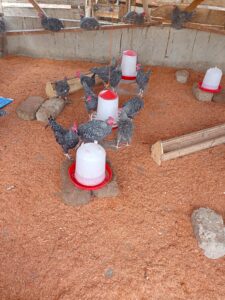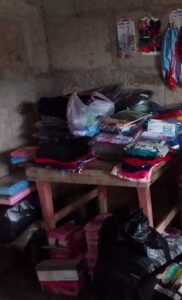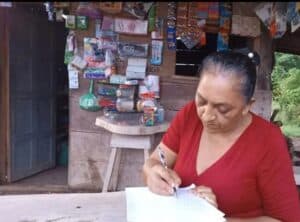No More Stunting in Beposo: Self-Help’s “Growing Healthy Food, Growing Healthy Children” Program
By Jerry Perkins and Nora Tobin
This article originally appeared in the Des Moines Register on October 14, 2018. Reprinted with permission.
Beposo, Ghana — Amos is a lucky boy. His mother, Felicia Mensah, is one of the first parents to join the “Growing Healthy Foods, Growing Healthy Children” pilot program that has been offered in this rural African village by Self-Help International (www.selfhelpinernational.org), a Waverly, IA organization that will celebrate its 60th year in 2019.
On Sept. 25, the mothers and infants enrolled in the “Growing Healthy Foods, Growing Healthy Children” program gathered so that Self-Help nutritionists could measure and record the weights and heights of the mothers and babies to gauge their progress in meeting the program’s goal of eliminating the stunting of pre-school age children.
The importance of improving infants’ and expectant mothers’ nutrition will be underscored on Oct. 18, when the 2018 World Food Prize is awarded to Drs. Lawrence Haddad and David Nabarro for their individual efforts in reducing maternal and early childhood malnutrition in Africa, South Asia and Latin America.
Baby Amos is a living example of the global leadership that Haddad and Nabarro have provided “in elevating maternal and child under-nutrition within the food security and development dialogue at national and international levels with the result of reducing th e world’s number of stunted children by 10 million between 2012 and 2017,” as the announcement of their selection as World Food Prize laureates stated.
e world’s number of stunted children by 10 million between 2012 and 2017,” as the announcement of their selection as World Food Prize laureates stated.
Haddad’s and Nabarro’s emphasis on improving nutrition for mothers and children in the critical first 1,000 days of life – the period from pregnancy to a child’s second birthday – is also the basis of Self-Help’s “Growing Healthy Foods, Growing Healthy Children” intervention, which began in February under the guidance of Dr. Mary Jane Oakland, an emeritus professor of Food Science and Human Nutrition at Iowa State University. She has served on Self-Help’s board of directors since 2006.
When Oakland traveled to Ghana in January 2018, she began to work on a program with Self-Help’s staff nutritionists to grow local foods that mothers can use as a weaning supplement that would be more nutritional for the child to prevent stunting.
In September, Oakland and the two of us returned to Ghana to monitor and advise on Self-Help’s programs, including the “Growing Healthy Foods, Growing Healthy Children” pilot program in Beposo.
Self-Help International’s mission is to alleviate hunger by helping people help themselves. Self-Help enlists a holistic approach to ending hunger by supporting parents to improve household food security long-term through improved farming methods and micro-credit loans, as well as starting school-feeding programs in primary schools in rural villages like Beposo to address immediate hunger needs.
Self-Help works with school Parent-Teacher Associations to start school farms where parents and students learn improved farming methods that they can use to increase crop yields. The emphasis is on growing nutrient-rich crops such as Quality Protein Maize (QPM), which was championed by Norman Borlaug, founder of the World Food Prize and Nobel Peace Prize laureate in 1970. (In 2000, the World Food Prize was awarded jointly to Drs. Surinder Vasal and Evangelina Villegas, whose research developed improved varieties of QPM.)
The QPM produced on the school farm is then prepared by a community volunteer into a breakfast porridge that is served to the children each morning. The schools report increased enrollment, improved daily attendance, and higher test scores when children have breakfast to start the school day.
As a key ally of Self-Help, Dr. Borlaug endorsed this project as “a simple and practical solution to alleviating hunger,” saying, “I recognize the benefits of QPM to young children in developing countries, where corn porridge is the typical weaning supplement. In addition, the project trains [local residents] to manage the feeding centers and includes anaffordable and available food source that allows project sustainability.”
While weighing and measuring the students in the school feeding program, Self-Help staff found that more than 25% of the children are stunted, which is slightly above than the national average of 22% in rural Ghana. These children arenot only short instature, but stunting affects their ability to learn, Oakland observed. The “Growing Healthy Food, Growing Healthy Children” program grew out of that unmet need for an intervention that could reach the mothers of infants before the children begin school during the critical phase of childhood brain development.
Designed by Self-Help’s Board and staff nutritionists in collaboration with Ghanaian nutrition specialists and development practitioners, the intervention targets pregnant women, lactating mothers, and the parents of weaning children like Amos. It combines nutrition education with healthy foods to fill the nutrition gap among mothers who are not consuming enough calories to properly grow and nourish their children.
Self-Help’s Ghanaian nutrition staff specialist, Jesse Jackson Sarkodie has been working extensively with the 59 expectant and new mothers living in the village of Beposo to educate them about the importance of good nutrition for the development of healthy children through both group seminars and one-on-one consultations.
Since the initial intake survey revealed that most households were food insecure and mothers were not consuming enough food to nourish both themselves and their nursing babies, supplemental meals of “Tom Brown”, a porridge prepared from locally-available QPM and cowpeas, are provided to mothers during pregnancy and lactation because it’s difficult for an expectant or new mother to grow their own food by farming.
Research with mothers and infants in Ghana has shown that some animal protein such as egg yolks is needed in the diet of weaning children to prevent nutritional damage, so eggs are also provided to children 6 months and older.
The mothers’ weight gain in pregnancy is monitored, and the length and wei ght of the babies is measured and recorded monthly. This process allows staff to offer immediate positive feedback when children are healthy, and inquire further and offer support if a child’s progress slows and is at risk of malnutrition. Raising a healthy child is no small feat in an environment where dirty water and malaria are the norm, but the mothers are determined to do their best.
ght of the babies is measured and recorded monthly. This process allows staff to offer immediate positive feedback when children are healthy, and inquire further and offer support if a child’s progress slows and is at risk of malnutrition. Raising a healthy child is no small feat in an environment where dirty water and malaria are the norm, but the mothers are determined to do their best.
To address household food security long-term, Self-Help’s agriculture training team has been teaching parents how to intercrop QPM with cowpeas or groundnuts, which are both legumes (black-eyed peas are a variety of cowpeas and peanuts are a variety of groundnut) that can be cultivated and combined to make a high-protein porridge to increase household protein consumption. Farmers like Amos’s mother also have been taught by the Self-Help agricultural advisers to grow orange-flesh sweet potatoes (OFSP) which are high in Vitamin A to add to the weaning food. (In 2016, Drs. Maria Andrade of Cape Verde, Robert Mwanga of Uganda, and Jan Low of the United States were jointly awarded the World Food Prize for developing the Vitamin A-enriched OFSP.)
Self-Help is also using its micro-credit and farm-input loan programs to introduce poultry. Raising poultry for family consumption or on a larger scale as a business to generate income will enable families to add hard-cooked egg yolks to the diet of weaning infants, or even the whole family.
In order to enroll in this intervention, the mother (and father when possible) must commit to both farming and nutritional counseling, which are the educational components of the program. Although much of the one-on-one counseling and group nutrition education sessions with the Self-Help nutritionists target the mothers, Oakland said that Self-Help’s staff members work to gain buy-in from fathers and the entire community.
“Still, at the end of the day, we won’t turn a mother away,” she stated. “We initially planned for 50 mothers and babies in the first year, but here we are eight months in and we already have 59 mothers and babies enrolled, so we’re working on finding the resources to ensure we can meet that commitment to support every mother in need.”
Meeting Self-Help’s goal of eliminating infant stunting means that, in four years when baby Amos starts school, every one of his classmates will be well-nourished and living up to his or her biological potential.




